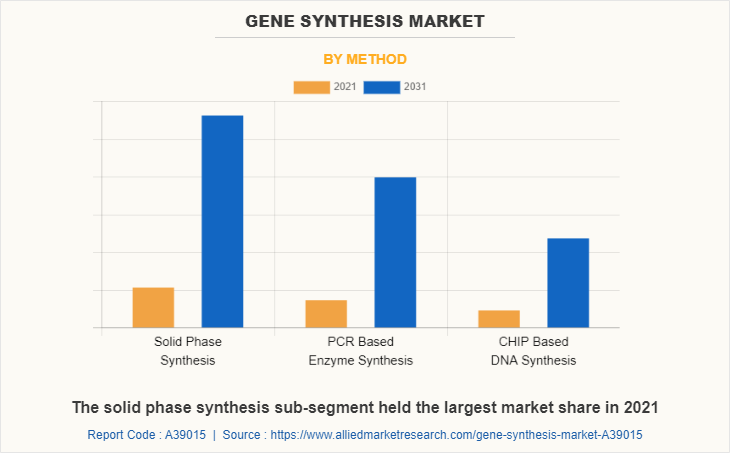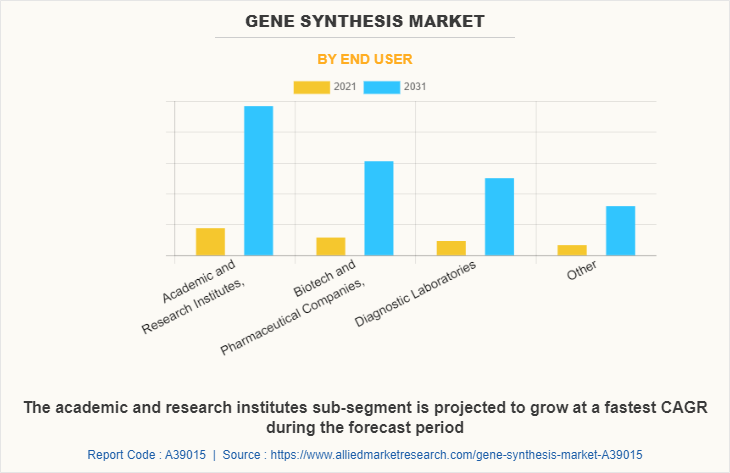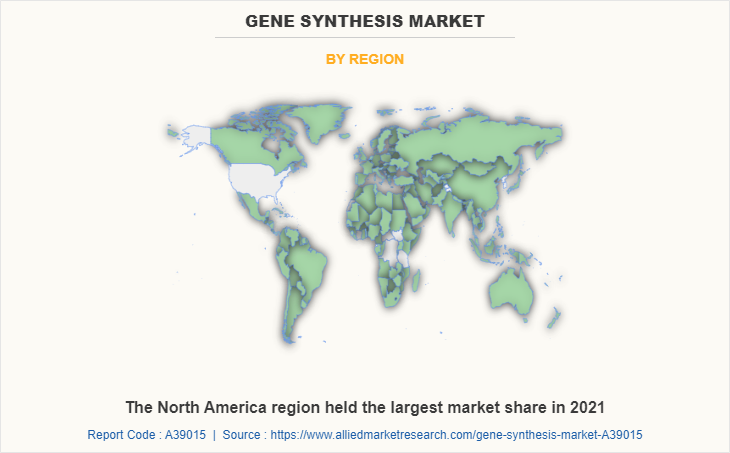Gene Synthesis Market Research, 2031
The global gene synthesis market size was valued at $1,110 million in 2021, and is projected to reach $5,979 million by 2031, growing at a CAGR of 18.4% from 2022 to 2031. Gene synthesis, also referred to as DNA printing, is a synthetic biology technique used in the lab for the production of artificial genes. It varies from molecular cloning and polymerase chain reaction (PCR), which both rely on preexisting DNA sequences, in that it is based on solid-phase DNA synthesis. Gene synthesis technique offers many different applications owing to which the gene synthesis market trends is expected to expand in the coming years. Genetic engineering has developed into a process known as gene synthesis to synthesise double-stranded DNA from oligonucleotides using various assembly techniques into plasmids for transfection. Healthcare professionals may now forecast pathogen behaviour before it becomes a severe worry thanks to evolution.

With changing lifestyles, many chronic disorders are spreading quickly within the population. Some most common chronic diseases include cancer, cardiology, HIV, gastrointestinal disorders, and many others. The use of gene synthesis in treating chronic diseases requires increased research and development, advancements in gene synthesis technologies produced biologically, and innovations that improve the efficacy and safety of the produced genes. This is also accompanied by improved demands from the medical sector, which requires more advanced techniques and skill work to carry out the procedures. Increased gene synthesis, considerable gene use in developing novel vaccines, and increased investment from businesses is expected to help the market grow during the forecast period.
The difficulties in employing gene synthesis techniques, as well as the high cost of the procedure in particular areas, may limit their development, thereby‐¯limiting the gene synthesis market share growth. High levels of competitiveness in the medical technology business, as well as extended lead times for ways to obtain, can likewise impede market progress. Gene synthesis introduces new techniques for DNA editing and synthesis, making it easier to modify biological agents and systems. These technologies enable the creation of disease or poison DNA that could be unintentionally or purposefully misapplied. All of these challenges are projected to hinder gene synthesis market revenue growth during the forecast period.
The knowledge of how DNA acts as the blueprint for life and its capacity to manipulate DNA for research, medical treatment, and industrial applications have both been revolutionized by gene synthesis technology. Gene synthesis is likely to‐¯become a vital tool for an expanding range of scientific disciplines and commercially significant applications with further advancements in automation, error correction, and cost effectiveness. To address issues with environmental protection and food security, the energy and agricultural industries will increasingly rely on gene synthesis. Bioengineered antibodies and DNA-based vaccinations will be utilised more frequently in healthcare. Designer organisms with specialised metabolic pathways will be widespread. Such future applications of gene synthesis are expected to offer excellent gene synthesis market opportunity.
Market Segmentation
The gene synthesis market is segmented on the basis of method, end user, and region. As per method, the market has been divided into solid phase synthesis, PCR based enzyme synthesis, and CHIP based DNA synthesis. By end user, the market has been classified into academic and research institutes, biotech and pharmaceutical companies, diagnostic laboratories, and other. Region wise, the market is analyzed across North America, Europe, Asia-Pacific, and LAMEA.

By method, the PCR-based enzyme synthesis segment is expected to have the fastest gene synthesis market growth during the forecast period. There are numerous advantages of using PCR. For starters, it is a simple strategy to learn and apply, and it provides results quickly. It is a sensitive process capable of producing millions to billions of copies of a single product for sequencing, cloning, and analysis. PCR-based technologies are employed in clinical diagnostics, forensic investigations, and agricultural biotechnology on a daily basis. These applications necessitate dependable performance, exceptional sensitivity, and tight standards.

By end user, the academic and research institutes dominated the global gene synthesis market in 2021. The segment growth can be attributed to an increase in people's preference for research environments for investigation and clinical research programs to undertake DNA synthesis activities. Furthermore, the increasing number of advances and discoveries in biotechnology and pharmaceuticals is a factor that is responsible for the increased number of new market players. These applications necessitate dependable performance, exceptional sensitivity, and tight standards.

By region, North America gene synthesis market accounted for a dominating market share in 2021. The increased use of gene editing and synthesis-related methods by pharmacological and diagnostic companies in the U.S. is boosting gene synthesis demand. Growing commercialization of synthetic gene products, as well as increased licensing by regulatory agencies such as the U.S. Food and Drug Administration, are expected to encourage expansion.
Competitive Landscape
The key players profiled in this gene synthesis market size report include Genscript Biotech Corporation, Thermo Fisher Scientific, Inc., Brooks Automation, Inc., Boster Biological Technology, Twist Bioscience Corporation, Danaher Corporation, Biomatik Corporation, ProteoGenix, ProMab Biotechnologies, Inc., and OriGene Technologies, Inc.
Impact of COVID-19 on Global Gene Synthesis Industry
- The COVID-19 pandemic positively impacted the gene synthesis market as hospitalization rate for infected patients increased during COVID-19 pandemic.
- Owing to increased cases of hospitalization due to rising COVID-19 infection, the need for an effective drug or a vaccine was generated which boosted the growth of gene synthesis techniques.
Key Benefits for Stakeholders
- This report provides a quantitative analysis of the market segments, current trends, estimations, and dynamics of the gene synthesis market analysis from 2021 to 2031 to identify the prevailing gene synthesis market opportunities.
- The market research is offered along with information related to key drivers, restraints, and opportunities.
- Porter's five forces analysis highlights the potency of buyers and suppliers to enable stakeholders make profit-oriented business decisions and strengthen their supplier-buyer network.
- In-depth analysis of the gene synthesis market segmentation assists to determine the prevailing market opportunities.
- Major countries in each region are mapped according to their revenue contribution to the global market.
- Market player positioning facilitates benchmarking and provides a clear understanding of the present position of the market players.
- The report includes the analysis of the regional as well as global gene synthesis market trends, key players, market segments, application areas, and market growth strategies.
Gene Synthesis Market Report Highlights
| Aspects | Details |
| Market Size By 2031 | USD 5979 million |
| Growth Rate | CAGR of 18.4% |
| Forecast period | 2021 - 2031 |
| Report Pages | 280 |
| By Method |
|
| By End User |
|
| By Region |
|
| Key Market Players | Codex DNA, OriGene Technologies, Inc., Brooks Automation, Inc., Biomatik, promab biotechnologies, inc., Genscript Technology, Integrated DNA Technologies, Inc., Boster Biological Technology, Twist Bioscience, Thermo Fisher Scientific, Inc. |
Analyst Review
The global gene synthesis market is expected to be driven due to rising prevalence of chronic diseases like cancer, across the world which has triggered the demand for vaccines and effective gene therapy. Also, the novel use of gene synthesis in the production of stretches of double-stranded DNA for cloning into plasmid vectors using oligonucleotides is further anticipated to drive the gene synthesis market share growth. However, the high cost of gene synthesis technique, use of expensive machines, and lack of availability of skilled technicians for operating and working on the gene synthesis technology is likely to hinder market growth. Growing demand for novel drugs and vaccines and increasing government fundings for extensive research activities involving gene synthesis is expected to boost the global gene synthesis market share growth in the forecast time period.
Among the analyzed regions, North America is expected to account for the highest revenue in the market by the end of 2031, followed by Europe, Asia-Pacific, and LAMEA. Availability of latest advanced gene synthesis techniques and machines, and availability of skilled professionals in the region is anticipated to drive the regional growth.
Gene therapy developed with advanced technology, as well as with new innovative medicines developed for the prevention of various ailments in an ageing population, are expected to boost the gene synthesis market. Gene therapy entails inserting genes into the patients' cells and increasing the efficacy of the gene to cure the condition, with long-term therapy involved to maximize the advantages of the treatment. Increased demands from the medical sector, as well as enhanced technology in treating disorders, contribute to the growth of the gene synthesis industry.
The major growth strategies adopted by gene synthesis market players are investment and agreement.
North America is expected to provide more business opportunities for the global gene synthesis market in the future.
Genscript Biotech Corporation is the major player in the gene synthesis market.
The academic and research institute sub-segment of the end-user segment acquired the maximum share of the global gene synthesis market in 2021.
Researchers and scientists are the potential customers in the gene synthesis market.
The report provides an extensive qualitative and quantitative analysis of the current trends and future estimations of the global gene synthesis market from 2021 to 2030 to determine the prevailing opportunities.
Loading Table Of Content...



